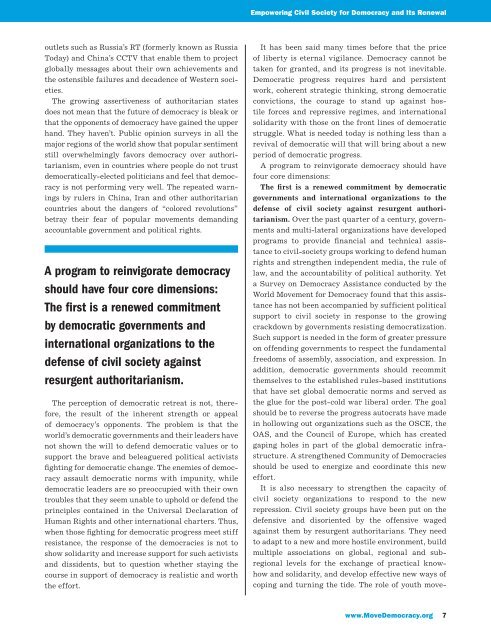Create successful ePaper yourself
Turn your PDF publications into a flip-book with our unique Google optimized e-Paper software.
Empowering Civil Society for Democracy and Its Renewal<br />
outlets such as Russia’s RT (formerly known as Russia<br />
Today) and China’s CCTV that enable them to project<br />
globally messages about their own achievements and<br />
the ostensible failures and decadence of Western societies.<br />
<strong>The</strong> growing assertiveness of authoritarian states<br />
does not mean that the future of democracy is bleak or<br />
that the opponents of democracy have gained the upper<br />
hand. <strong>The</strong>y haven’t. Public opinion surveys in all the<br />
major regions of the world show that popular sentiment<br />
still overwhelmingly favors democracy over authoritarianism,<br />
even in countries where people do not trust<br />
democratically-elected politicians and feel that democracy<br />
is not performing very well. <strong>The</strong> repeated warnings<br />
by rulers in China, Iran and other authoritarian<br />
countries about the dangers of “colored revolutions”<br />
betray their fear of popular movements demanding<br />
accountable government and political rights.<br />
A program to reinvigorate democracy<br />
should have four core dimensions:<br />
<strong>The</strong> first is a renewed commitment<br />
by democratic governments and<br />
international organizations to the<br />
defense of civil society against<br />
resurgent authoritarianism.<br />
<strong>The</strong> perception of democratic retreat is not, therefore,<br />
the result of the inherent strength or appeal<br />
of democracy’s opponents. <strong>The</strong> problem is that the<br />
world’s democratic governments and their leaders have<br />
not shown the will to defend democratic values or to<br />
support the brave and beleaguered political activists<br />
fighting for democratic change. <strong>The</strong> enemies of democracy<br />
assault democratic norms with impunity, while<br />
democratic leaders are so preoccupied with their own<br />
troubles that they seem unable to uphold or defend the<br />
principles contained in the Universal Declaration of<br />
Human Rights and other international charters. Thus,<br />
when those fighting for democratic progress meet stiff<br />
resistance, the response of the democracies is not to<br />
show solidarity and increase support for such activists<br />
and dissidents, but to question whether staying the<br />
course in support of democracy is realistic and worth<br />
the effort.<br />
It has been said many times before that the price<br />
of liberty is eternal vigilance. Democracy cannot be<br />
taken for granted, and its progress is not inevitable.<br />
Democratic progress requires hard and persistent<br />
work, coherent strategic thinking, strong democratic<br />
convictions, the courage to stand up against hostile<br />
forces and repressive regimes, and international<br />
solidarity with those on the front lines of democratic<br />
struggle. What is needed today is nothing less than a<br />
revival of democratic will that will bring about a new<br />
period of democratic progress.<br />
A program to reinvigorate democracy should have<br />
four core dimensions:<br />
<strong>The</strong> first is a renewed commitment by democratic<br />
governments and international organizations to the<br />
defense of civil society against resurgent authoritarianism.<br />
Over the past quarter of a century, governments<br />
and multi-lateral organizations have developed<br />
programs to provide financial and technical assistance<br />
to civil-society groups working to defend human<br />
rights and strengthen independent media, the rule of<br />
law, and the accountability of political authority. Yet<br />
a Survey on Democracy Assistance conducted by the<br />
World Movement for Democracy found that this assistance<br />
has not been accompanied by sufficient political<br />
support to civil society in response to the growing<br />
crackdown by governments resisting democratization.<br />
Such support is needed in the form of greater pressure<br />
on offending governments to respect the fundamental<br />
freedoms of assembly, association, and expression. In<br />
addition, democratic governments should recommit<br />
themselves to the established rules-based institutions<br />
that have set global democratic norms and served as<br />
the glue for the post-cold war liberal order. <strong>The</strong> goal<br />
should be to reverse the progress autocrats have made<br />
in hollowing out organizations such as the OSCE, the<br />
OAS, and the Council of Europe, which has created<br />
gaping holes in part of the global democratic infrastructure.<br />
A strengthened Community of Democracies<br />
should be used to energize and coordinate this new<br />
effort.<br />
It is also necessary to strengthen the capacity of<br />
civil society organizations to respond to the new<br />
repression. Civil society groups have been put on the<br />
defensive and disoriented by the offensive waged<br />
against them by resurgent authoritarians. <strong>The</strong>y need<br />
to adapt to a new and more hostile environment, build<br />
multiple associations on global, regional and subregional<br />
levels for the exchange of practical knowhow<br />
and solidarity, and develop effective new ways of<br />
coping and turning the tide. <strong>The</strong> role of youth move-<br />
www.MoveDemocracy.org 7


